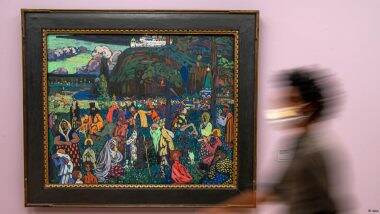The outgoing German government wants to change the restitution process for Nazi-looted art. Lawyers, historians and victims' associations have reservations.January 8, 2025 was a notable day for the heirs of Jewish art collectors whose collections were expropriated or sold against their will by the Nazis. On that day, Germany's federal cabinet cleared the way for a change in the country's restitution process. It marks the end of the expert panel officially called the "Advisory Commission on the return of cultural property seized as a result of Nazi persecution, especially Jewish property." It has become known as the Limbach Commission, named for its first chairperson, the late former German chief justice Jutta Limbach. Now the panel will be replaced by arbitration tribunals. German Culture Minister Claudia Roth (Green Party) said in a statement that this would enable Germany to better fulfill its historical responsibility towards the descendants of the victims of the Nazi regime. But not everyone agrees with her, and the dissolution of the commission has been met with criticism.
A look at history reveals the significance of this decision: During the Nazi dictatorship between 1933 and 1945, hundreds of thousands of works of art were taken from their mostly Jewish owners in Germany, whether through direct expropriation or in other morally dubious ways — such as through forced sales. Experts therefore speak of Nazi-looted property, and estimate that at least 200,000 objects in Germany alone fall under that definition.
Also Read | Latest News | Intense Cold in Parts of Himachal Pradesh; Rain or Snow Likely at Some Places from Feb 8-12.
Over the past decades, many objects have changed hands several times. Quite a few masterpieces are now in public collections — such as "Madame Soler" by Pablo Picasso, in Bavaria. The works' new owners are in no hurry to honor the restitution claims, especially as many of them believe they acquired the objects in good faith from the art trade in the post-war decades.
In contrast to many other countries, such as France or Austria, Germany has no restitution law.
No restitution law in Germany
All attempts to get one off the ground have so far failed due to widespread skepticism among politicians and museum curators. In practice, such a restitution law would have "no relevance, as no state museum can afford not to restitute a work of art to the heirs of the rightful owner if it is identified as looted art," explained Hermann Parzinger, President of the Prussian Cultural Heritage Foundation, as recently as 2015. Instead, he said, there should be more investment in provenance research and, above all, greater support for smaller museums in their efforts to search their collections for looted art.
This means that even in 2025, there will be no binding legal basis for the descendants of the victims to sue for restitution claims that are outside a statute of limitations. Experts consider this unacceptable, especially in Germany, the "land of the perpetrators."
In 1998, Germany helped adopt the Washington Declaration — a document in which 44 countries and numerous organizations and victims' associations agreed on the demand for a "fair and just solution" to cases of Nazi-looted art. The Limbach Commission was and is responsible for implementing the Washington Principles and settling disputed cases.
Advisory commission: Prestige without power?
With eight to ten legal experts, philosophers, historians and former politicians, the Limbach Commission has always had prominent members. However, the commission could only make recommendations, which were not legally binding. In addition, it could only take action if it was called upon by both sides simultaneously. As a result, the commission was only able to deal with 25 cases in the twenty years of its existence.
"That's quite embarrassing at first glance," says Hans-Jürgen Papier, chairman of the commission and former President of the Federal Constitutional Court. "But it wasn't the Commission's fault," Papier told DW. "It can only become active if both parties, i.e. the victims or their descendants on the one hand and the body preserving the cultural property on the other, make an appeal. And unfortunately, often enough, the cultural property preservation bodies have not agreed to the appeal."
However, Papier says the cases that have been decided have "great effect" according to Papier. That's because it's the particularly complex proceedings that end up before the commission, so its decisions also often had what he described as a "precedent-setting effect," saying they set standards for further negotiations or extra-judicial mediation.
The Advisory Commission celebrated its 20th anniversary in September 2023 with a ceremony held at the Jewish Museum in Berlin. Papier gave a speech at the event in which he criticized that fact that, despite the two decades of political and moral declarations of commitment, there was still no legally binding set of rules. He said the commission must be made more effective, for instance by allowing it to be invoked unilaterally and making its decisions binding.
Shortly thereafter, the dissolution of the commission was decided by the culture ministers of the federal states and the office of the Minister of State for Culture, Claudia Roth. The country's state premiers confirmed the decision, as did the Federal Cabinet at the beginning of this year.
Pros and cons of arbitration tribunals
Now the Commission is to be replaced by arbitration tribunals, each made up of two historians and three lawyers. In this way, the German government hopes to be able to better implement the Washington Principles. But Hans-Jürgen Papier and numerous victims' representatives take a different view. "The planned arbitration law blatantly worsens the situation of the victims," they wrote in an open letter to Chancellor Olaf Scholz in January 2025. "With the new restitution rules, entire groups of victims, such as persecuted art dealers, will no longer be able to get back the works of art they sold during the Nazi era under threat of persecution," the authors wrote, adding: "Even those persecuted persons who had to sell cultural property in connection with their flight from Nazi Germany or from a country occupied by the Nazis will in future have only very limited claims to restitution."
Among those signing the open letter were restitution experts, victims' lawyers and descendants of the victims. They also criticized the continuing lack of clarity about the legal basis upon which the arbitration tribunals will decide, since there is still no restitution law. The signatories therefore made a now-obsolete demand that the decision be postponed pending public discussion of the planned arbitration proceedings in the parliament's Legal Affairs Committee.
Cautious optimism
Meanwhile, DW has spoken with several representatives of institutions and museums with publicly held collections affected by restitution claims, who see the reform as "progress." In retrospect, the "legal unpredictability" of the Limbach Commission, a lack of transparency and the dubious professional suitability of some committee members were criticized.
They say they expect a "more robust and sober legal routine" from the arbitration tribunals. And, they argue, in any case, many restitution cases had been decided without the Limbach Commission, so that works of art could be returned, showing that there can be restitution without a commission.
So what's next?
Papier, who chaired the Limbach Commission for many years, does not believe the decision to dissolve it will be reversed. That's all the more reason to develop the arbitration tribunals into a functioning model. Anything else would be "disgraceful," he told DW. Representatives of the museums see it that way, too. And all sides seem to agree on one thing: Germany needs a restitution law.
This article was originally published in German and edited by Sarah Hucal.
(The above story first appeared on LatestLY on Feb 07, 2025 08:00 PM IST. For more news and updates on politics, world, sports, entertainment and lifestyle, log on to our website latestly.com).













 Quickly
Quickly


